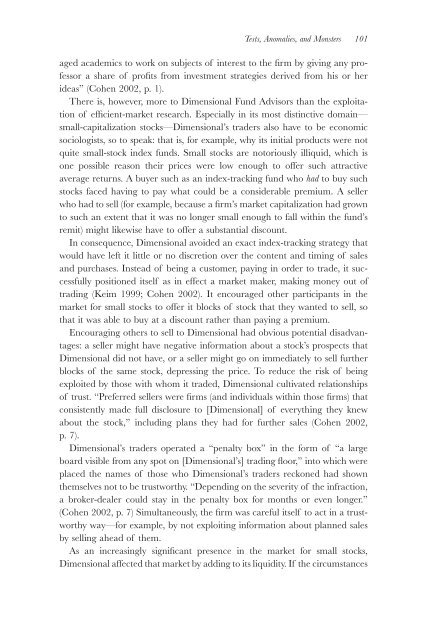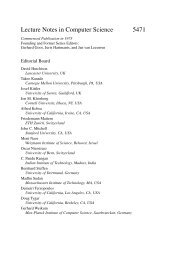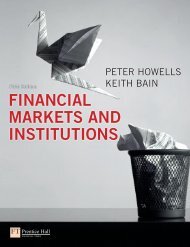- Page 1 and 2:
An Engine, Not a CameraHow Financia
- Page 3 and 4:
Inside Technologyedited by Wiebe E.
- Page 5 and 6:
© 2006 Massachusetts Institute of
- Page 8 and 9:
ContentsAcknowledgementsix1Performi
- Page 10 and 11:
AcknowledgementsTo research and to
- Page 12:
An Engine, Not a Camera
- Page 15 and 16:
2 Chapter 1influence grew, he took
- Page 17 and 18:
4 Chapter 1global and apparently im
- Page 19 and 20:
6 Chapter 1but does not oblige the
- Page 21 and 22:
8 Chapter 1The mathematicization of
- Page 23 and 24:
10 Chapter 1‘explains’ much by
- Page 25 and 26:
12 Chapter 1we might call the “ep
- Page 27 and 28:
14 Chapter 1and the trace of owners
- Page 29 and 30:
16 Chapter 1performs, shapes and fo
- Page 31 and 32:
18 Chapter 1means that it is used,
- Page 33 and 34:
20 Chapter 1Third, in Robert K. Mer
- Page 35 and 36:
22 Chapter 1Difficulties remain eve
- Page 37 and 38:
24 Chapter 1of stock-price changes
- Page 39 and 40:
26 Chapter 1of science and the hist
- Page 41 and 42:
28 Chapter 1of LTCM’s crisis pres
- Page 43 and 44:
30 Chapter 1a Barnesian strand to t
- Page 45 and 46:
32 Chapter 1Chapter 6 turns to the
- Page 47 and 48:
34 Chapter 1own applications was im
- Page 50 and 51:
2Transforming FinanceIn the 1950s,
- Page 52 and 53:
Transforming Finance 39States: the
- Page 54 and 55:
Transforming Finance 41A second pap
- Page 56 and 57:
Transforming Finance 43simplified a
- Page 58 and 59:
was inadequate: “. . . they have
- Page 60 and 61:
Transforming Finance 47in a year’
- Page 62 and 63:
Transforming Finance 49Figure 2.1Th
- Page 64 and 65: Koopmans as head of the Cowles Comm
- Page 66 and 67: Transforming Finance 53100). Instea
- Page 68 and 69: Transforming Finance 55follows from
- Page 70 and 71: Although Sharpe did not know it at
- Page 72 and 73: Transforming Finance 59The market,
- Page 74 and 75: Transforming Finance 61successive t
- Page 76 and 77: Transforming Finance 63made a mista
- Page 78 and 79: Transforming Finance 65walk was a b
- Page 80: Transforming Finance 67could not ha
- Page 83 and 84: 70 Chapter 3A New SpecialtyAnother
- Page 85 and 86: 72 Chapter 3focusing on stocks and
- Page 87 and 88: 74 Chapter 3which “an individual
- Page 89 and 90: 76 Chapter 3the Wall Street Journal
- Page 91 and 92: 78 Chapter 3theory? Buffett’s inv
- Page 93 and 94: 80 Chapter 3security analysis today
- Page 95 and 96: 82 Chapter 3“securities are corre
- Page 97 and 98: 84 Chapter 31978, p. 62) The 1970s,
- Page 99 and 100: 86 Chapter 3proponent of efficient-
- Page 101 and 102: 88 Chapter 3development preceded an
- Page 103 and 104: 90 Chapter 4(CRSP). Even Fama and M
- Page 105 and 106: 92 Chapter 4disappears when we cont
- Page 107 and 108: 94 Chapter 4theorist Stephen Ross o
- Page 109 and 110: 96 Chapter 4phenomena to merit a sp
- Page 111 and 112: 98 Chapter 4interpreted in more tha
- Page 113: 100 Chapter 4smallest 20 percent of
- Page 117 and 118: 104 Chapter 4The testimony of arbit
- Page 119 and 120: 106 Chapter 4“The random walk the
- Page 121 and 122: 108 Chapter 4Though the case of a s
- Page 123 and 124: 110 Chapter 4that is closer to that
- Page 125 and 126: 112 Chapter 4If changes in short ti
- Page 127 and 128: 114 Chapter 4the data better than t
- Page 129 and 130: 116 Chapter 4the tools that are ava
- Page 131 and 132: 118 Chapter 4were vanishing—what
- Page 133 and 134: 120 Chapter 5prices tended to rise
- Page 135 and 136: 122 Chapter 5Warrants and other for
- Page 137 and 138: 124 Chapter 5determining warrant pr
- Page 139 and 140: 126 Chapter 5Thorp and Kassouf depi
- Page 141 and 142: 128 Chapter 5decisions typically in
- Page 143 and 144: 130 Chapter 5Among the assets to wh
- Page 145 and 146: 132 Chapter 5in August 1970, becaus
- Page 147 and 148: 134 Chapter 5cases aside, a rationa
- Page 149 and 150: 136 Chapter 5So Merton set to work
- Page 151 and 152: 138 Chapter 5The mathematical compl
- Page 153 and 154: 140 Chapter 5prices in this way was
- Page 155 and 156: 142 Chapter 5The Black-Scholes-Mert
- Page 157 and 158: 144 Chapter 6Plywood and shrimp did
- Page 159 and 160: 146 Chapter 6of the dollar itself w
- Page 161 and 162: 148 Chapter 6to close the “gold w
- Page 163 and 164: 150 Chapter 6the pedestrian, “the
- Page 165 and 166:
152 Chapter 6held my hand tightly a
- Page 167 and 168:
154 Chapter 6would help him, “inc
- Page 169 and 170:
156 Chapter 6remain stable in membe
- Page 171 and 172:
158 Chapter 6Black-Scholes analysis
- Page 173 and 174:
160 Chapter 6sold, but they were no
- Page 175 and 176:
162 Chapter 6become interested in o
- Page 177 and 178:
164 Chapter 6Black’s sheets to th
- Page 179 and 180:
166 Chapter 6in the terminology of
- Page 182 and 183:
Pits, Bodies, and Theorems 169As th
- Page 184 and 185:
Pits, Bodies, and Theorems 171In 19
- Page 186 and 187:
Pits, Bodies, and Theorems 173The M
- Page 188 and 189:
Pits, Bodies, and Theorems 175Futur
- Page 190:
Pits, Bodies, and Theorems 177By 19
- Page 193 and 194:
180 Chapter 7the size of position i
- Page 195 and 196:
182 Chapter 7and then to adjust a p
- Page 197 and 198:
184 Chapter 7on the markets.” If
- Page 199 and 200:
186 Chapter 7. . . the crowd detect
- Page 201 and 202:
188 Chapter 7300 points at that tim
- Page 203 and 204:
190 Chapter 7with the main “blue
- Page 205 and 206:
192 Chapter 7In the absence of a mo
- Page 207 and 208:
194 Chapter 7the large number of sm
- Page 209 and 210:
196 Chapter 7‘crashes’ can occu
- Page 211 and 212:
198 Chapter 7Indeed, sunshine tradi
- Page 213 and 214:
200 Chapter 7pension funds wished t
- Page 215 and 216:
202 Chapter 7is a limit case of the
- Page 217 and 218:
204 Chapter 7draw on it. However, a
- Page 219 and 220:
206 Chapter 7realized he had to sel
- Page 221 and 222:
208 Chapter 7options, whereas a rel
- Page 223 and 224:
210 Chapter 7bar [margin requiremen
- Page 225 and 226:
212 Chapter 8Bonds, Derivatives, an
- Page 227 and 228:
214 Chapter 8From the mid 1970s on,
- Page 229 and 230:
216 Chapter 8sophistication in orde
- Page 231 and 232:
218 Chapter 8to arbitrage would typ
- Page 233 and 234:
220 Chapter 8LTCM’s returns befor
- Page 235 and 236:
222 Chapter 8quantities of five-yea
- Page 237 and 238:
224 Chapter 8Was LCTM’s Trading A
- Page 239 and 240:
226 Chapter 8find anyone inside or
- Page 241 and 242:
228 Chapter 8Even if the details of
- Page 243 and 244:
230 Chapter 8Initially, the Russian
- Page 245 and 246:
232 Chapter 8Furthermore, as market
- Page 247 and 248:
234 Chapter 8Quite reasonably, Meri
- Page 249 and 250:
236 Chapter 8Information Act shows
- Page 251 and 252:
238 Chapter 8Table 8.1Average impli
- Page 253 and 254:
Table 8.3LTCM’s thirteen major po
- Page 255 and 256:
242 Chapter 8A Global Microstructur
- Page 257 and 258:
244 Chapter 9Making ModelsAs with c
- Page 259 and 260:
246 Chapter 9When research producti
- Page 261 and 262:
248 Chapter 9into a “working rout
- Page 263 and 264:
250 Chapter 9dividend discount mode
- Page 265 and 266:
252 Chapter 9Derivatives were haunt
- Page 267 and 268:
254 Chapter 9competently and with a
- Page 269 and 270:
256 Chapter 9many were Ph.D. studen
- Page 271 and 272:
258 Chapter 9As a result, the Black
- Page 273 and 274:
260 Chapter 9It is conceivable that
- Page 275 and 276:
262 Chapter 9It is also plausible
- Page 277 and 278:
264 Chapter 9The more stable prices
- Page 279 and 280:
266 Chapter 9anticipation of how ou
- Page 281 and 282:
268 Chapter 9emphasizes the ways in
- Page 283 and 284:
270 Chapter 9from this knowledge? T
- Page 285 and 286:
272 Chapter 9not exist a close subs
- Page 287 and 288:
274 Chapter 9treat markets not in t
- Page 290 and 291:
Appendix AAn Example of Modigliani
- Page 292:
Appendix BLévy DistributionsThe di
- Page 295 and 296:
282 Appendix Csuch as a warrant or
- Page 297 and 298:
284 Appendix DBlack’s work with S
- Page 299 and 300:
286 Appendix EThe portfolio of a un
- Page 301 and 302:
288 Appendix E$400$200$100$100$50$2
- Page 303 and 304:
290 Appendix Fquestion. Party A fin
- Page 305 and 306:
292 Appendix Gto the haircut was 3
- Page 307 and 308:
294 Appendix HLocation ofInterviewe
- Page 310 and 311:
GlossaryThis glossary contains the
- Page 312 and 313:
Glossary 299expected value If a qua
- Page 314 and 315:
Glossary 301preferred stock Stock w
- Page 316 and 317:
NotesChapter 11. Leo Melamed, email
- Page 318 and 319:
Notes to pp. 11-16 30523. See, for
- Page 320 and 321:
41. A “limit order” to buy an o
- Page 322 and 323:
13. Another source recommended to M
- Page 324 and 325:
43. See, e.g., Galison 1994; Jeriso
- Page 326 and 327:
Notes to pp. 83-91 31318. Source: O
- Page 328 and 329:
quantity of the product that will b
- Page 330 and 331:
44. The role of Clark’s work is e
- Page 332 and 333:
normal distribution. Using the Tayl
- Page 334 and 335:
11. See, e.g., Hull interview. Abol
- Page 336 and 337:
4. Brady Commission 1988, pp. 40-41
- Page 338 and 339:
Notes to pp. 210-221 325derivatives
- Page 340 and 341:
Notes to pp. 239-253 32726. For Ger
- Page 342 and 343:
19. Miller’s own theory of “vir
- Page 344:
Sources of Unpublished DocumentsBla
- Page 347 and 348:
334 ReferencesArmatte, Michel. 1998
- Page 349 and 350:
336 ReferencesBlack, Fischer. 1975b
- Page 351 and 352:
338 ReferencesBruck, Connie. 1989.
- Page 353 and 354:
340 ReferencesCox, John C., Jonatha
- Page 355 and 356:
342 ReferencesFama, Eugene F., and
- Page 357 and 358:
344 ReferencesGennotte, Gérard, an
- Page 359 and 360:
346 ReferencesHassoun, Jean-Pierre.
- Page 361 and 362:
348 ReferencesJensen, Michael C., a
- Page 363 and 364:
350 ReferencesKushner, H.J. 1967. S
- Page 365 and 366:
352 ReferencesMacKinlay, A. Craig.
- Page 367 and 368:
354 ReferencesMelamed, Leo, with Bo
- Page 369 and 370:
356 ReferencesModigliani, Franco. 1
- Page 371 and 372:
358 ReferencesPassell, Peter. 1997.
- Page 373 and 374:
360 ReferencesRoss, Stephen A. 1976
- Page 375 and 376:
362 ReferencesSEC Division of Marke
- Page 377 and 378:
364 ReferencesStambaugh, Robert F.
- Page 379 and 380:
366 ReferencesVoorhees, Mark. 1988.
- Page 381 and 382:
368 ReferencesZorn, Dirk M. 2004.
- Page 383 and 384:
370Maggie Mort, Building the Triden
- Page 385 and 386:
372 IndexCalculators, 159, 160Calis
- Page 387 and 388:
374 IndexJournal of Finance, 38Jour
- Page 389 and 390:
376 IndexSamuelson, P., 8-12, 31, 6











